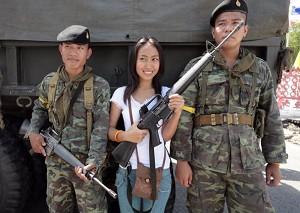The recent peaceful coup d'etat in Thailand attracted worldwide attention. Many Chinese associate the events in Thailand with China’s current political situation, and are concerned that it may be an inspiration for a coup in China, and wonder if such a coup is possible in China. Feedback from mainland China’s media and overseas Chinese reveals that the Chinese army has undergone tremendous changes in recent years.
Thai Coup D'Etat’s Inspiration for China
According to a Liberation Daily newspaper report on September 20, after watching news of the Thai coup, teachers and students of a Chinese Communist Party (CCP) School in mainland China had a heated debate about this incident’s inspiration for China.
One side believes that during the six years of Thaksin Shinawatra’s rule, the Thai farmers’ per capita income increased 60 percent. Shinawatra implemented a cheap healthcare plan with government subsidies. He won support in poor areas, mainly from farmers in northern Thailand, where most of the country’s population lives. However the majority of the taxpayers—the middle class who live mainly in the south—did not get any tax breaks. They had grown resentful towards Prime Minister Shinawatra due to tax hikes.
This side believes that while stressing balanced development across the country and macroeconomic control, the Chinese regime should pay attention to ensure the development of coastal areas and the main large- and middle-sized cities. Otherwise, discontent from the residents in these developed areas may pose a threat to the regime.
The other side of the debate thinks that China is not Thailand. Since the majority of the officers and soldiers in the People’s Liberation Army come from the poor countryside, the policies of macroeconomic control and balanced development are beneficial to the majority of the people. They feel there is no need to fear a coup in China.
There is also a view that the peaceful Thai coup was not met with public and political resistance because of the extreme corruption of Prime Minister Shinawatra. The Thai people had already completely abandoned him. From this perspective, the CCP Central Committee’s ongoing effort to counter corruption is indeed a matter of substance that bears upon the survival or destruction of the CCP.
The other side thinks that only Shinawatra’s family benefited from his corruption, so he was regarded as an enemy among the upper class. China is different however, since the corruption in China seems to be structural. Various interest groups benefit from it, hence in practice, the counter-corruption movement in China still has many difficulties and obstacles.



